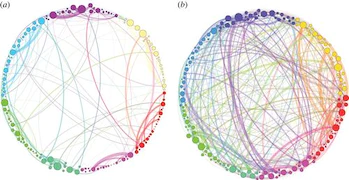CLINICAL PSILOCYBIN RESEARCH
Though lengthy, the below article is overall the most comprehensive clinical overview of how psilocybin is structured, its history and geography, how it acts on the brain (based on input from several other studies) and current ongoing clinical research. Published by National Library of Medicine by 8 co-authors.
LINK TO NIH: THE THERAPEUTIC POTENTIAL OF PSILOCYBIN
Other research findings with links are below.

RECONNECTS BRAIN REGIONS, FORMS NEW PATHWAYS
Psilocybin creates new links between previously unconnected brain regions. Typically, the signals in your brain follow the same pathways day after day. They’re a bit like a jogger who runs the same route through the neighborhood every day. This is known as the Default Mode Network, and is strongly associated with your ‘Ego’ (Sense of Self Identity, including limiting or damaging beliefs).
When researchers in the below study compared the brains of participants who had received an injection of psilocybin versus a placebo, signals were taking all kinds of new paths and forming different connections.
Essentially, psilocybin freed the brain’s activity from being confined to its usual pathways and let it wander freely. This allows people the opportunity to choose what thoughts to think, what beliefs to believe. It is one of the main mechanisms between psilocybin’s powerful ‘get mentally & emotionally unstuck’ effect. Below is an illustration of the brain’s connection points on placebo versus on a therapeutic psilocybin dose.

Source: Journal of the Royal Society Research Publications
‘RESETS’ THE BRAIN
Researchers from Imperial College London used psilocybin – the psychoactive compound that occurs naturally in magic mushrooms – to treat a small number of patients with depression in whom conventional treatment had failed.
“We have shown for the first time clear changes in brain activity in depressed people treated with psilocybin after failing to respond to conventional treatments.”
“Several of our patients described feeling ‘reset’ after the treatment and often used computer analogies. For example, one said he felt like his brain had been ‘defragged’ like a computer hard drive, and another said he felt ‘rebooted’.”
“Psilocybin may be giving these individuals the temporary ‘kick start’ they need to break out of their depressive states and these imaging results do tentatively support a ‘reset’ analogy.”
Source: Imperial College of London
INCREASES PERSONALITY TRAIT OF ‘OPENNESS’ FOR LONG TERM
A single high dose of the hallucinogen psilocybin, the active ingredient in so-called “magic mushrooms,” was enough to bring about a measurable personality change lasting at least a year in nearly 60 percent of the 51 participants in a new study, according to the Johns Hopkins researchers who conducted it.
Lasting change was found in the part of the personality known as openness, which includes traits related to imagination, aesthetics, feelings, abstract ideas and general broad-mindedness. Changes in these traits, measured on a widely used and scientifically validated personality inventory, were larger in magnitude than changes typically observed in healthy adults over decades of life experiences, the scientists say. Researchers in the field say that after the age of 30, personality doesn’t usually change significantly.
“Normally, if anything, openness tends to decrease as people get older,” says study leader Roland R. Griffiths, a professor of psychiatry and behavioral sciences at the Johns Hopkins University School of Medicine.
Source: Johns Hopkins Medicine
OTHER RESEARCH ORGANIZATIONS & LINKS
JOHNS HOPKINS CENTER FOR PSYCHEDELIC & CONSCIOUSNESS RESEARCH
BECKLEY FOUNDATION PSILOCYBIN RESEARCH (WORLD LEADING)
MASS GENERAL HOSPITAL CENTER FOR NEUROSCIENCE OF PSYCHEDELICS
(HAS A FANTASTIC INTRO PAGE INCLUDING TREATMENT RESISTANCE)
UC BERKELEY CENTER FOR THE SCIENCE OF PSYCHEDELICS
NYU CENTER FOR PSYCHEDELIC MEDICINE
YALE PROGRAM FOR PSYCHEDELIC SCIENCE
STANFORD PSYCHEDELIC SCIENCE GROUP
UNIVERSITY OF TEXAS AT AUSTIN: CENTER FOR PSYCHEDELIC RESEARCH & THERAPY
IMPERIAL COLLEGE OF LONDON CENTRE FOR PSYCHEDELIC RESEARCH
OREGON HEALTH AUTHORITY REFERENCE COLLECTION OF 162 PSILOCYBIN STUDIES:
ACCESS HERE

